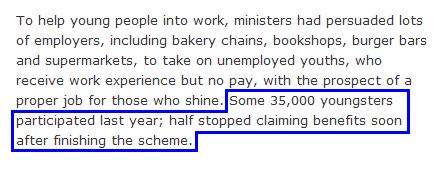Economist corrects the record over Government work experience
Last month Full Fact asked the Economist to correct one of its articles covering the Government's controversial work experience scheme.
Jonathan Portes, Director of the National Institute of Economic and Social Research (NIESR) had written to the newspaper pointing out that they had mistakenly exaggerated the success of the scheme - claiming that half of its participants had found paid work after completion.
Full Fact found back in February that the Prime Minister had made the same mistake in the House of Commons. At the time, the Government's own analysis showed that half of the participants had moved off benefits, but had no information on how many paricipants had actually found paid work.
Our initial requests to the Economist to correct the record were unsuccessful as the newspaper said it wasn't their standard practice to print corrections, and the letter from Mr Portes was adequate in pointing out the mistake.
In addition, the newspaper told us that they only corrected online articles when mistakes were "egregious", which in their view this one was not. We weren't satisfied with this as the misrepresentation of the success of a government scheme is at least a "significant" inaccuracy that must be corrected under the Editor's Code of Practice.
After contacting the Economist's Editor to pursue the matter further, we were yesterday able to secure an online correction, which can now be found here.
BEFORE

AFTER

The Economist article also now adds:
"This article originally stated that half of the participants in the work-experience programme found work shortly after completing the scheme. In fact that proportion stopped claiming benefits. See letter Adhering to the facts"
Since the original claims were made by the Prime Minister and the Economist, the Department for Work and Pensions have published a more thorough analysis of the work experience programme. The analysis shows work experience participants were more likely to have found work than non-participants, but still shows no support for the claim that half of the participants had actually found work.
Full Fact is pleased the Economist has finally corrected its online article and we appreciate the prominence of the correction on the article page itself, which will instantly alert returning readers to the alteration.
However the episode should never have taken as long as it did, and we will still ask the Economist to clarify its policy on corrections so that others in future will have an easier time having their own issues dealt with.